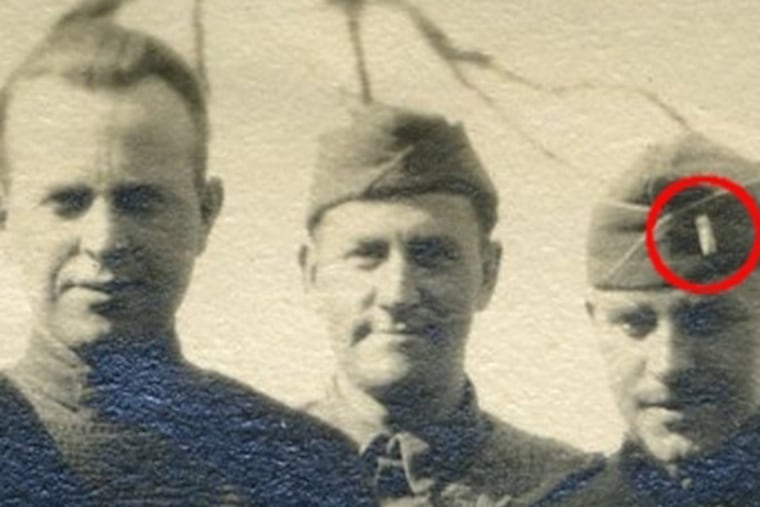George Wills - another generation tied to history
Three generations of men named George Wills are now connected to history, courtesy of the People Paper. Pvt. George Wills fought alongside Sgt. Alvin York in the Oct. 8, 1918, battle that made York a hero of World War I. As legend has it, York single-handedly killed 28 German soldiers and captured 132 others.

Three generations of men named George Wills are now connected to history, courtesy of the People Paper.
Pvt. George Wills fought alongside Sgt. Alvin York in the Oct. 8, 1918, battle that made York a hero of World War I. As legend has it, York single-handedly killed 28 German soldiers and captured 132 others.
Ninety years later, on Oct. 8, the Daily News reported that a group of descendants of the 16 other men in York's unit claimed their relatives had fought just as hard and deserved to share in his glory.
The group was looking for descendants of one Pvt. George Wills, of South Philadelphia. Then, on Oct. 27, the Daily News shared the memories of South Philly native Joe Sullivan, who had contacted the paper after reading the earlier article. Sullivan and Wills had been friends when Sullivan was a teenager and Wills was in his 50s.
Sullivan described Wills as a "tough old bird" who lived in a squatter's village on Stone House Lane, a winding, unpaved road between 2nd and 3rd streets, just south of Oregon Avenue.
The first article also caught the attention of George Wills' 61-year-old grandson - also named George Wills - and his wife, Carol, 60, of Manning, S.C.
Wills, a retired union boilermaker, was raised by his mother and stepfather and only recently developed a relationship with his father, George Wills, son of the World War I private.
Knowing virtually nothing about his family history, the third George Wills didn't think it was possible that the man in the article could have been a relative. But his father confirmed that in fact he was.
George Wills, 85, a retired dump-truck driver - and an Army veteran of World War II - still lives in a run-down rowhouse in South Philadelphia. Hanging on the dirt-streaked walls of his dining room are photos of his father, Private Wills, as a young man in uniform and as an adult.
He shared memories of his father with the Daily News - and, for the first time, with his son.
As he remembered it, his father was a heavy drinker who often fought with his mother, Dora. She had a fierce temper, too, and once threatened her husband with a butcher knife she held to his throat, Wills recalled.
When he was 12, he said, his brother Jimmy, 13, shot him in the head with a .45 automatic pistol. Doctors told his parents that the bullet had lodged too close to his brain to be safely removed.
"They said I'd be dead by 17," said the middle George Wills.
But it was Jimmy who died young, at 15. One night, after picking iron from boxcars to sell for a couple of extra dollars, Jimmy started to build a fire to warm his hands, forgetting that his clothes were covered in oil. He burned to death, leaving Wills - who was often mistaken for his twin - devastated.
A year later, in 1938, Wills and his mother left his father and rented a house at 6th Street and Oregon Avenue.
"She didn't want to leave, but she knew it was best for her," said Wills.
The middle Wills kept in touch with his father, stopping by the house every day to make sure that he was all right and meeting up with him at a diner every now and then for lunch.
"He would order the cheapest thing on the menu, the vegetable platter," said Wills. "Just to save a dime. I'd always scrape some of my meat onto his plate."
Wills said that his father never specifically addressed his wartime experiences, but deeply resented York's fame and wealth.
When the 1941 film "Sergeant York" was in the works, a representative from Warner Bros. Pictures visited Private Wills and offered him $200 to sign a release allowing his name to be used.
Wills refused, and was so angered by the suggestion that he beat his son with a horsewhip when the younger Wills visited that night, the son recalled.
Wills said his father knew that York had been offered $500,000 plus 2 percent of the gross profit of the movie.
For most of his life, Pvt. George Wills worked odd jobs, operating a feed wagon for a time and scavenging dump yards for scrap metal to sell. Later, he got a job working at a coal-handling plant in the Navy Yard. The middle Wills said the coal dust did a number on his father's lungs. In 1966, at age 69, he died from tuberculosis.
Spurred by the Daily News article, sharing memories of his father has helped bring Wills and his son closer, Carol Wills said.
"This has opened the door for my husband to learn about a family he barely knew," she said. "It's been a wonderful discovery for all of us."
Meanwhile, Joe Sullivan, who managed to track down the middle Wills just before Carol and her husband read the article, visited him last month and was shocked.
While growing up, Sullivan hadn't known that Pvt. Wills had any children. But when he saw the 85-year-old Wills, he realized he must have encountered him before, somewhere down on Stone House Lane.
"I recognized him immediately," he said.